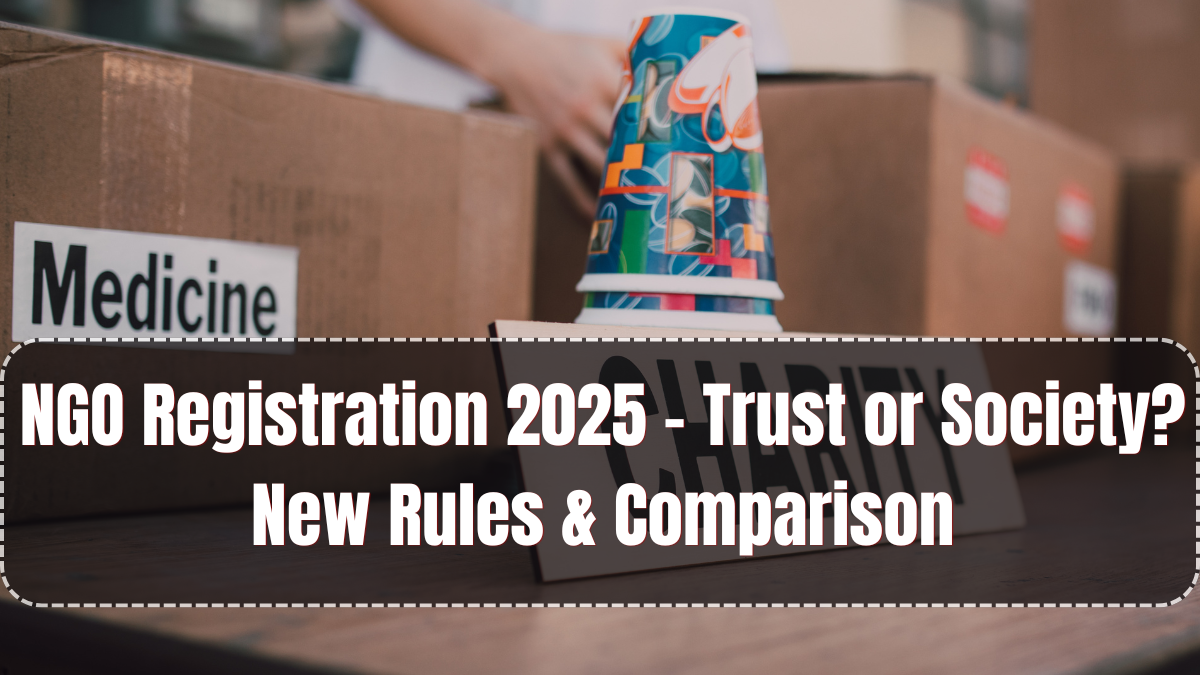With growing interest in social impact and community service, thousands of citizens across India are registering NGOs to bring change in education, healthcare, women empowerment, rural development, and environment. If you’re planning to register an NGO in 2025, it’s important to understand the revised laws, documentation needs, and whether you should register as a Trust, Society, or Section 8 Company.
This detailed guide explains all the new updates in the ngo registration process in India for 2025 and gives a clear comparison between Trusts and Societies to help you choose the best form for your mission.

What Is an NGO and Why Register It?
An NGO (Non-Governmental Organization) is a legal entity created to work for social welfare without profit motives. Registering an NGO gives your group legal recognition, tax benefits, eligibility for government schemes, and access to grants and foreign funding.
Major benefits of NGO registration:
-
Eligibility for CSR and government funding
-
Income tax exemption under Sections 12A and 80G
-
Credibility for donors and volunteers
-
Ability to open a current bank account
-
Legal status to enter contracts, own property, and sue/be sued
In 2025, the Ministry of Corporate Affairs (MCA) and NITI Aayog have introduced certain compliance and documentation reforms for all types of NGOs to ensure better transparency and tracking.
Types of NGO Registration in India
There are three legal forms to register an NGO:
-
Trust – Governed by the Indian Trusts Act, 1882 (or state-specific Trust Acts)
-
Society – Governed by the Societies Registration Act, 1860
-
Section 8 Company – Registered under the Companies Act, 2013 (for professionals and larger scale NGOs)
For small to medium social work initiatives, most choose between Trust and Society.
Trust vs Society – Comparison Table 2025
| Feature | Trust | Society |
|---|---|---|
| Governing Act | Indian Trusts Act / State Trust Act | Societies Registration Act, 1860 |
| Minimum Members | 2 Trustees | 7 Managing Committee Members |
| Area of Operation | Generally State-specific | Can be National or International |
| Legal Recognition | Local recognition | Widely accepted for government grants |
| Annual Filing | Not compulsory in all states | Annual list submission is mandatory |
| Internal Governance | Settlor-controlled | Democratic – one member one vote |
| Amendment Flexibility | Difficult to amend trust deed | Easier to amend society bylaws |
| Preferred Use | Religious, charitable institutions | Education, health, women/youth support |
What Are the New Rules for NGO Registration in 2025?
In 2025, the following key updates have been made:
-
Mandatory Aadhaar verification of all trustees/members
-
NGOs must now register on NGO Darpan portal (NITI Aayog) before applying for grants
-
For FCRA eligibility (foreign funding), 3-year operation proof is required with clean audit reports
-
Digital registration through e-filing is now standard in many states
-
New e-governance dashboard launched to track NGO performance, filing, and activities
-
NGOs failing to file annual returns for 2 consecutive years may lose their 12A/80G benefits
These reforms are aimed at increasing accountability and encouraging only serious organizations to stay active.
How to Register a Trust or Society – Step-by-Step
1. Choose a Name
The name should be unique and not resemble any government body or existing NGO.
2. Prepare Legal Documents
For Trust: Prepare a Trust Deed
For Society: Prepare Memorandum of Association (MoA) and Rules & Regulations
3. Get Signatures from Founding Members
-
Trust: 2 trustees (settlor + 1 more)
-
Society: Minimum 7 members from different states (for national level)
4. Submit Documents at Registrar Office
Carry address proof, ID proof, photographs, NOC from landlord, and required stamp paper.
5. Registration Certificate Issued
Once documents are verified, the Registrar will issue a Certificate of Registration within 15–30 working days.
6. Apply for PAN, Bank Account, and 12A/80G
To claim tax benefits and open bank accounts, apply for PAN card, 12A, and 80G certifications from the Income Tax Department.
Note: In many states, you can also register online via e-district portals.
Which One Should You Choose in 2025?
Choose Trust if:
-
You want more control as a settlor
-
You are setting up a religious or spiritual organization
-
You want fewer compliance burdens
Choose Society if:
-
You aim for education, women, children, health-related work
-
You want to apply for government grants and CSR funds
-
You are comfortable with group decisions and elections
Choose Section 8 Company if:
-
You want high transparency and fundraising from corporates
-
You have a pan-India or international vision
FAQs
What is the easiest way to register an NGO in India?
Registering as a Trust is the easiest method, especially in rural areas or smaller towns. It requires fewer members and simpler paperwork.
Is online NGO registration available in 2025?
Yes, most states now allow online registration of NGOs via their e-governance or e-district portals. You can fill the form, upload documents, and track status digitally.
How long does it take to get an NGO registered?
It generally takes 15 to 30 working days, depending on the state and document correctness.
Can an NGO receive foreign donations?
Yes, but only after getting FCRA registration from the Ministry of Home Affairs. Your NGO must be at least 3 years old and maintain clean financial records.
Is it mandatory to register on the NGO Darpan portal?
Yes, from 2025 onward, all NGOs seeking government schemes, CSR funds, or benefits under 12A/80G must be listed on the NGO Darpan portal.
Click here to know more.
